Coffee Basics
Decaf Coffee: Benefits, Methods, And Misconceptions
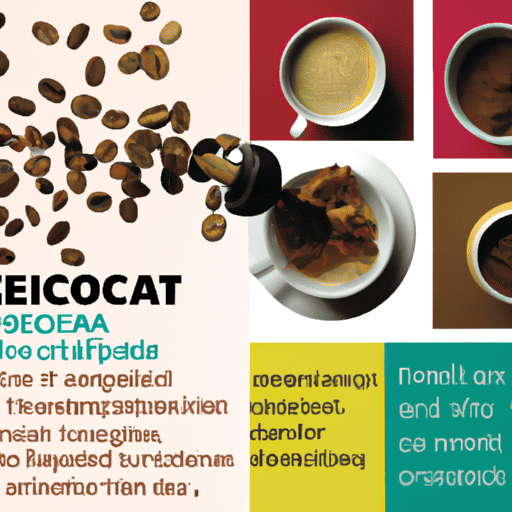
As a coffee lover, I understand the struggle of wanting to enjoy the taste of coffee without the jitters and restlessness that come with caffeine. That’s where decaf coffee comes in.
Decaf coffee is a great alternative for those who want to reduce their caffeine intake but still enjoy the aroma and flavor of coffee. However, there are many misconceptions surrounding decaf coffee, including its health effects and the best methods for decaffeination.
In this article, I will explore the benefits of decaf coffee, the various methods for decaffeination, and the misconceptions surrounding the taste of decaf coffee.
Firstly, it’s important to understand what decaf coffee is. Decaf coffee is coffee that has had most of its caffeine removed through a decaffeination process. This process doesn’t completely remove all caffeine, but it reduces it to a level that is considered safe for consumption by most people.
Decaf coffee is often enjoyed by those who are sensitive to caffeine, pregnant women, or those who simply want to enjoy a cup of coffee without the side effects of caffeine. However, there are many misconceptions about decaf coffee that I will address in this article.
Key Takeaways
- Decaf coffee has almost the same amount of antioxidants as regular coffee and has no harmful effects, making it a popular choice for those who want to cut down on caffeine.
- The best decaf method is to ask what method the brand uses, and the four common methods for decaffeination are Organic Solvent, Supercritical Carbon Dioxide, Swiss Water, and Triglyceride.
- CO2 processed beans are a good option for cutting down on caffeine, while Swiss Water is a healthy option but may not yield the best taste.
- The coffee industry is breeding Coffea charrieriana with Arabica varieties to create a low caffeine coffee plant with Arabica flavor, potentially changing the future of decaf coffee.
What is Decaf?
I know that decaf coffee is a popular choice for those who want to cut down on caffeine. Decaf coffee alternatives use various methods for decaffeination, including Organic Solvent, Supercritical Carbon Dioxide, Swiss Water, and Triglyceride.
Decaf coffee has almost the same amount of antioxidants as regular coffee, which may protect against certain cancers. Additionally, decaf coffee has no harmful effects, making it a great alternative for those who are sensitive to caffeine.
There are many health benefits of decaf, including the protection from certain cancers because of the polyphenol antioxidants found in coffee. However, decaffeinating coffee is expensive and can result in flavor loss. Therefore, roasting plays a major role in taste and artisan and large reputable roasters offer great decaf options.
It’s important to know what method the brand uses, as some methods, such as the Roselius method, are no longer used due to health concerns.
Decaffeination Methods
One popular decaffeination method is the Swiss Water process, which uses green coffee extract and a special filter to remove caffeine while preserving flavor. This method is considered to be a healthier option because it uses no chemical solvents. However, some argue that Swiss Water does not yield the best tasting decaf beans.
On the other hand, the solvent method is also widely used, using either methylene chloride or ethyl acetate. Methylene chloride is a debated chemical due to its potential health risks, while ethyl acetate is considered to be less toxic and is deemed safe by the FDA. The solvent method is known to preserve the flavor of the coffee better than other decaf methods, but some may have concerns about potential residues of solvents in the coffee beans.
Overall, when choosing a decaf option, the decaf method used by a brand should be considered, whether it is a solvent or solvent-free method, to ensure the best flavor preservation.
Future of Decaf
The future of decaffeinated coffee may lie in breeding naturally low caffeine coffee plants with the flavor of Arabica varieties.
The coffee industry has been exploring the potential of Coffea charrieriana, a caffeine-free species discovered in Cameroon in 2008.
This plant is being bred with Arabica varieties to create a low caffeine coffee plant with the desired flavor profile.
This low caffeine breeding could have a significant impact on the coffee industry.
It could provide a solution for those who want to enjoy coffee but are sensitive to caffeine.
It could also benefit those who want to reduce their caffeine intake without sacrificing flavor.
However, it is important to note that this breeding process is still in its early stages and it may take several years before we see widespread adoption of low caffeine coffee plants.
Frequently Asked Questions
Is decaf coffee completely caffeine-free or does it still contain a small amount of caffeine?
Decaf coffee still contains a small amount of caffeine, but the levels are significantly lower than regular coffee. The amount can vary depending on brewing methods, roasting techniques, and decaf blends. Organic options are available, and the health benefits and flavor profiles are similar to regular coffee.
Are there any potential health risks associated with consuming decaf coffee?
Potential risks associated with consuming decaf coffee are minimal and depend on consumption frequency. Studies have shown that decaf coffee is generally safe for most individuals, but excessive consumption may lead to acid reflux or other digestive issues.
How do different decaffeination methods affect the taste of the coffee?
The taste impact of decaffeination methods varies. CO2 and methyl chloride yield the best tasting decaf beans, while the Swiss Water method may sacrifice flavor. Brewing techniques can also affect taste, so it’s important to choose a reputable roaster.
Are there any notable differences in the nutritional content of decaf coffee compared to regular coffee?
Decaf coffee has lower levels of caffeine but almost the same amount of antioxidants as regular coffee. However, decaf coffee may have slightly lower levels of some vitamins and minerals compared to regular coffee.
Are there any popular brands or roasters that specialize in producing high-quality decaf coffee?
When it comes to high-quality decaf coffee, popular roasters such as Intelligentsia and Stumptown offer flavorful options with ethical sourcing and sustainability in mind. Flavor profiles vary, but CO2 processed beans are a great choice for flavor and caffeine reduction.
Conclusion
So, there you have it: decaf coffee is not only a great option for those looking to cut back on caffeine, but it also offers a range of health benefits. From reducing the risk of heart disease to improving liver function, decaf coffee can be a valuable addition to a healthy diet. And with a variety of decaffeination methods available, there’s no need to sacrifice flavor or quality.
In fact, did you know that decaf coffee accounts for approximately 12% of coffee sales worldwide? That’s right; over 1 in 10 cups of coffee consumed globally are decaf. With this growing demand, we can expect to see even more innovation and development in the world of decaf coffee, including the creation of new low-caffeine coffee plants.
So, whether you’re a coffee lover looking to cut back on caffeine or simply curious about the world of decaf, there’s never been a better time to explore this exciting and ever-evolving field.
Arf, an author and an innovative enthusiast of coffee, coffee alternatives, and tea, plays a crucial role as a contributor to the esteemed Cappuccino Oracle platform. Renowned for his curiosity and passion for these captivating beverages, Arf has carved out a unique space for himself in the world of exploration and writing. He realized that coffee, coffee alternatives, and tea are not mere drinks to keep one awake, but universes of flavors and stories waiting to be explored.
Arf’s articles for Cappuccino Oracle blend meticulous research with personal experiences, providing readers with an in-depth understanding of various types of coffee, coffee alternatives, and tea, along with their unique characteristics, cultures, and histories. His honest reviews and engaging narratives guide readers on their own journeys, helping them discover their preferences and find their perfect brew.
Coffee Basics
The Gut-Coffee Connection: How Your Daily Cup Affects Digestive Health
Find out how your daily cup of coffee impacts your digestive health and discover surprising effects that could change your morning routine forever.

Your daily cup of coffee can greatly affect your digestive health. It stimulates gastric acid production, which helps digest food but might irritate sensitive stomachs. Drinking moderate amounts—around 1 to 3 cups daily—can enhance gut motility and even promote the growth of beneficial bacteria like Bifidobacteria. However, if you have conditions such as IBS or GERD, coffee might exacerbate your symptoms. Choosing low-acid or dark roasts can lessen discomfort. Staying hydrated and pairing coffee with high-fiber foods can support digestion too. There's much more to discover about how coffee interacts with your gut health.
Key Takeaways
- Moderate coffee consumption can stimulate gastric acid secretion, aiding digestion and improving bowel motility for many individuals.
- Antioxidants in coffee, particularly chlorogenic acids, promote gut health by reducing inflammation and improving digestive efficiency.
- Regular coffee intake enhances the growth of beneficial bacteria like Bifidobacteria, supporting a diverse gut microbiota and aiding nutrient absorption.
- Coffee may exacerbate symptoms for individuals with conditions like IBS or GERD, leading to digestive discomfort.
- Staying hydrated and consuming high-fiber foods alongside coffee can optimize its digestive health benefits while minimizing potential side effects.
Historical Significance of Coffee

The historical significance of coffee stretches back to the 15th century when an Ethiopian goat herder first noticed its energizing effects on his goats. This discovery marked the beginning of a beverage that would evolve into a cultural staple across various societies.
Coffee comes from the harvested berries of Coffea plants, which undergo processing methods like wet or dry processing before they're roasted and ground into your daily cup. Over time, various brewing methods, such as the French press and espresso, have emerged, each contributing to the unique experience of enjoying coffee and its varied caffeine levels.
In many cultures, coffee was more than just a drink; it played a crucial role in social interactions and rituals. Monks used coffee to stay awake during long prayer sessions, highlighting its function in enhancing alertness and focus.
Yet, coffee's stimulating properties rendered it a controversial drink in some regions, leading to temporary bans. Despite this, it found its way into the hearts (and hands) of many, becoming an integral part of daily life.
With its rich history, coffee has transcended its origins, influencing societies and cultures worldwide. Its journey from Ethiopian goats to global coffeehouses showcases not only its energizing effects but also its enduring place in human connection.
Coffee's Effects on Digestion

Coffee can have a significant impact on your digestion, both positively and negatively. Regular coffee consumption stimulates gastric acid secretion, which can aid digestion but might also cause discomfort like heartburn or diarrhea, especially in sensitive individuals.
Coffee varieties and preparation techniques can influence how your body reacts to caffeine. If you enjoy moderate consumption of up to three cups daily, you may experience improved bowel motility and relief from constipation. However, the acidity in coffee can irritate your stomach lining and exacerbate gastrointestinal disorders like gastroesophageal reflux disease (GERD) and gastritis.
Choosing dark roasted coffee can be beneficial, as it typically has lower acidity compared to lighter roasts, potentially reducing digestive discomfort. This choice can help you enjoy your favorite beverage without triggering heartburn.
Additionally, research indicates that regular coffee drinkers may experience positive changes in gut microbiota composition, promoting the growth of beneficial bacteria. This shift can enhance your overall digestive health, making coffee a double-edged sword.
While it can offer benefits, it's crucial to listen to your body and adjust your intake accordingly to avoid any adverse effects.
Benefits for Gut Health

When you enjoy your daily cup of coffee, you're not just savoring a rich flavor; you're also reaping benefits for your gut health.
Coffee's antioxidant properties can help reduce inflammation, while its ability to enhance gut motility can keep things moving smoothly.
Additionally, coffee may interact positively with other beverages, such as cranberry juice consumption, promoting overall digestive health.
Plus, regular consumption promotes the growth of beneficial bacteria, supporting a balanced microbiome.
Antioxidant Properties of Coffee
How does coffee, often celebrated for its rich flavor, also serve as a powerhouse of antioxidants that can benefit your gut health? Coffee is packed with antioxidants, particularly chlorogenic acids, which can greatly reduce oxidative stress and inflammation in your gastrointestinal tract.
This reduction in inflammation helps promote overall gut health, allowing your digestive system to function more efficiently. Additionally, essential oils for digestive support can complement coffee's benefits by promoting a healthy digestive environment.
Regular coffee consumption has been linked to an increase in beneficial bacteria, such as Bifidobacteria, which enhances microbiome diversity. A diverse microbiome is essential for peak digestive health, as it supports the balance of good bacteria in your gut.
Studies suggest that enjoying about 3.5 cups of coffee daily might even correlate with a 15% lower risk of death from all causes, partly due to its antioxidant properties that support gut health.
Additionally, the antioxidants in coffee may assist in recovery following gastrointestinal surgeries, further showcasing their role in improving digestive health.
Enhanced Gut Motility
A warm cup of coffee can do wonders for your gut motility, stimulating your intestines and helping alleviate constipation. Research shows that coffee consumption is linked to enhanced gastrointestinal activity, making it a great choice for those seeking constipation relief. The caffeine content plays a significant role in promoting bowel frequency, often leading to quicker waste elimination compared to just drinking water.
Here's a quick look at how coffee supports your digestive health:
| Aspect | Impact |
|---|---|
| Coffee Consumption | Increases gut motility |
| Caffeine Content | Boosts gastrointestinal activity |
| Antioxidants | Supports a healthy gut microbiome |
| Improved Bowel Function | Enhances recovery post-surgery |
Regular coffee drinkers often report improved bowel function, and studies suggest that moderate intake can lead to better gastrointestinal recovery. Plus, the antioxidants in coffee contribute to a healthier gut microbiome, further promoting digestive health. So, next time you reach for your cup, remember that your gut will likely thank you!
Beneficial Bacteria Growth
Coffee can really boost the growth of beneficial bacteria in your gut, playing an essential role in maintaining digestive health. Studies show that regular coffee consumption increases the levels of Bifidobacteria, a type of beneficial bacteria important for gut health. The chlorogenic acids in coffee actively promote the growth of these beneficial microbes while inhibiting harmful bacteria, enhancing your microbiome's overall balance.
In addition, incorporating natural remedies alongside your coffee intake can additionally support your digestive health. Moderate coffee intake also supports gastrointestinal recovery, helping your gut heal after surgery or illness. This recovery is essential for restoring function and ensuring your digestive system operates effectively.
Moreover, coffee drinkers tend to enjoy a more diverse gut microbiota, linked to better overall health outcomes and improved nutrient absorption.
One of the standout benefits of coffee is its anti-inflammatory properties, which help reduce gut inflammation. This creates a favorable environment for beneficial bacteria to thrive, making your gut healthier and more resilient.
Potential Risks and Side Effects
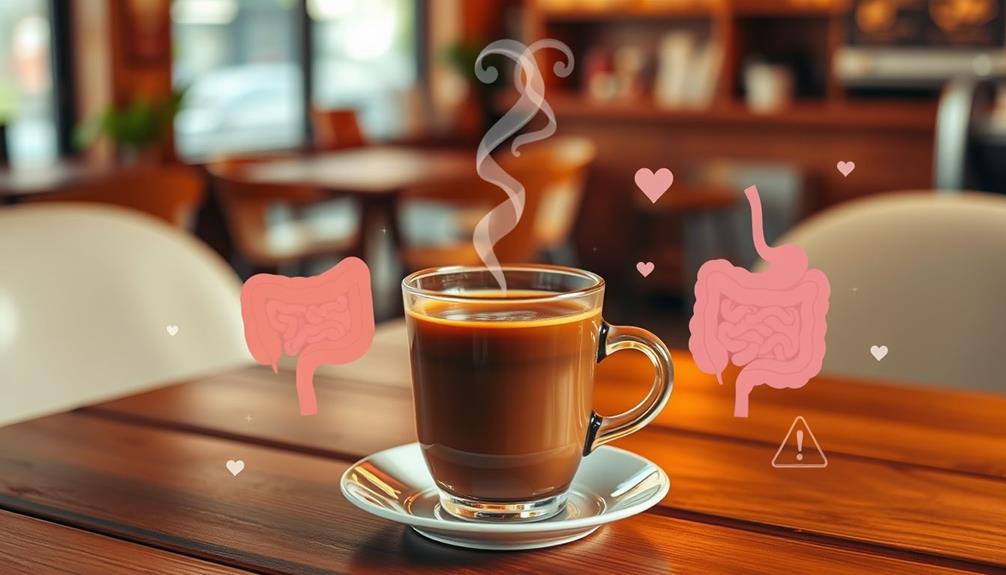
While coffee can offer some gut benefits, it's important to be aware of the potential risks it poses.
Individuals with conditions like Borderline Personality Disorder (BPD) may experience heightened emotional responses, which can further complicate their digestive health when consuming caffeinated beverages.
If you have conditions like irritable bowel syndrome or gastroesophageal reflux, coffee might worsen your symptoms.
Additionally, concerns about mycotoxin sensitivity could add another layer of complexity to your coffee consumption.
Irritable Bowel Syndrome Exacerbation
Exacerbation of Irritable Bowel Syndrome (IBS) can be a frustrating experience, especially when dietary choices come into play. If you're a coffee drinker, it's important to understand how coffee consumption might impact your symptoms.
The caffeine content in coffee can stimulate intestinal motility, potentially leading to loose stools or diarrhea, which are common issues for those with IBS. This can cause significant gastrointestinal discomfort and digestive disturbances that you'd rather avoid.
Additionally, ensuring a clean environment with ideal air quality can also contribute positively to your overall digestive health, as air purifiers can enhance indoor air quality.
Research shows that a substantial percentage of individuals with Inflammatory Bowel Disease (IBD) consume coffee, yet many report adverse effects. If you have IBS, be aware that coffee might alter your gut microbiota composition, further complicating your digestive health.
Monitoring your coffee intake is essential. Excessive consumption can exacerbate your symptoms, making it necessary to make personalized dietary choices tailored to your needs.
Heartburn and Gastroesophageal Reflux
For many people, enjoying a cup of coffee can quickly turn into a battle with heartburn and gastroesophageal reflux disease (GERD). Coffee consumption has been linked to increased gastric acid production, which may exacerbate symptoms of GERD in sensitive individuals. As a coffee drinker, you might experience symptoms like:
| Symptoms of GERD | Potential Causes |
|---|---|
| Heartburn | Increased gastric acid |
| Regurgitation | Stomach irritation |
| Dyspepsia | Coffee consumption |
While a 2014 meta-analysis showed no significant link between coffee and GERD, individual responses can vary greatly. Some studies suggest that coffee may worsen gastrointestinal discomfort, particularly for those with pre-existing conditions. If you have gastritis or other sensitive gastric issues, coffee might irritate your stomach lining, leading to uncomfortable symptoms.
It's vital to listen to your body. If you notice that your daily cup triggers heartburn or other GERD symptoms, consider adjusting your coffee consumption. Balancing your love for coffee with your digestive health is essential for long-term comfort.
Mycotoxin Sensitivity Concerns
Mycotoxin sensitivity can pose significant risks for coffee lovers, especially for those with a heightened reaction to mold. Mycotoxins are toxic compounds produced by certain molds that can contaminate coffee, potentially causing gastrointestinal discomfort.
While studies indicate harmful levels are rarely found in commercially available coffee, individuals sensitive to these toxins may still experience adverse effects when consuming varieties that haven't undergone mycotoxin testing. To support your investment in health, consider looking into brands with strong reputations for quality and safety, similar to the trusted reputation in the financial services sector found in the Gold IRA market.
To protect your digestive health, consider making informed dietary choices. Opting for organic coffee can help reduce exposure to mycotoxins, as these products often adhere to stricter regulations regarding mold contamination.
Additionally, selecting brands that conduct mycotoxin testing guarantees you're drinking coffee that's safer for your unique sensitivity.
It's essential to acknowledge that some coffee drinkers report gastrointestinal symptoms related to mycotoxin sensitivity, underscoring the importance of consumer safety.
If you're prone to discomfort after your daily cup, it may be wise to evaluate your coffee selection carefully. By prioritizing organic options and brands committed to testing, you can enjoy your coffee while minimizing potential risks associated with mycotoxins.
The Role of Mycotoxins

The presence of mycotoxins in coffee raises important questions about food safety and individual health. Mycotoxins are toxic compounds produced by certain molds that can sometimes be found in food products, including coffee.
While current studies suggest that harmful levels of mycotoxins aren't typically present in coffee consumption, those with mold sensitivity might experience gastrointestinal symptoms and digestive issues after drinking coffee.
Additionally, understanding the concept of diversification can be vital for individuals choosing various foods, including coffee, to mitigate health risks. To mitigate potential risks, it's important to promote consumer awareness regarding mycotoxin exposure. Choosing organic coffee from brands that conduct thorough mycotoxin testing can help guarantee safer options. Regulatory limits exist for mycotoxin levels in food, underscoring the significance of monitoring these compounds to maintain food safety.
Although many enjoy the health benefits of coffee, understanding the role of mycotoxins is essential, especially for individuals sensitive to molds. Anecdotal evidence indicates that some may struggle with digestive issues linked to mycotoxin presence.
Consequently, as you enjoy your daily cup, staying informed about mycotoxin risks can empower you to make better choices for your digestive health.
Research Insights on Coffee

Research into coffee's effects on digestive health reveals a complex relationship that can benefit or challenge individuals depending on their unique sensitivities.
Moderate coffee consumption, typically defined as 2.5 to 3.5 cups daily, is associated with increased gastrointestinal recovery and improved bowel motility, especially for those dealing with constipation. This intake can also boost levels of beneficial bacteria, such as Bifidobacteria, which are vital for gut health. Additionally, incorporating a balanced diet can further enhance digestive wellness and support overall health.
However, if you have conditions like irritable bowel syndrome (IBS) or GERD, you might experience exacerbated symptoms with coffee consumption. While some studies indicate that caffeine can trigger gastrointestinal discomfort, meta-analyses show no significant link between coffee intake and an increased risk of gastrointestinal diseases.
Ongoing research explores how coffee components interact with gut microbiota, highlighting the significance of understanding the long-term effects on digestive health.
As you consider your coffee habits, it's important to recognize that individual responses can vary. Balancing the benefits of coffee with your personal sensitivities can help you make informed choices about your daily cup.
Tips for Healthy Consumption

When it comes to enjoying coffee without compromising your digestive health, moderation is key. Aim for moderate levels of coffee consumption, ideally between 1 to 3 cups per day. This helps prevent digestive discomfort, especially if you have gastrointestinal issues.
Choosing dark roast coffee can also be beneficial; it typically has lower acidity and higher levels of N-methylpyridinium, which may reduce stomach acid production and irritation.
If you have a sensitive stomach or suffer from acid reflux, consider low-acid coffee options like Puroast. Always pay attention to your personal health responses after coffee consumption, as tolerance can vary considerably. This is particularly important for those with conditions like IBS or IBD.
Staying hydrated is essential, so balance your coffee intake with plenty of water. Pairing your coffee with a high-fiber diet can further support gut health and mitigate potential negative effects on your digestive system.
Frequently Asked Questions
What Does Drinking Coffee Every Day Do to Your Gut?
Drinking coffee every day can stimulate your bowel movements, potentially easing constipation. However, it might irritate your stomach if you're sensitive, leading to discomfort. Moderation's key; listen to your body's signals for the best results.
Does a Cup of Coffee Help With Digestion?
Picture a morning sun rising over a bustling town; that's what coffee brings to your digestive system. It can kickstart your intestines, stimulating movement and potentially easing discomfort, depending on your individual sensitivity.
Does Coffee Cause Inflammation in the Gut?
Coffee can cause inflammation in your gut, especially if you're sensitive. While it may promote beneficial bacteria, it might also trigger issues like IBS or GERD, leading to discomfort and increased inflammation in some individuals.
Can Coffee Cause Digestive Problems?
You might've noticed stomach discomfort after that morning coffee. It's not just you—many experience digestive issues like heartburn or diarrhea. Moderation is key; too much caffeine can really upset your gut.
Conclusion
So, the next time you take that first sip of coffee, remember: it's not just a morning ritual. Your daily cup could be influencing your digestive health in ways you hadn't imagined. Are you ready to uncover the secrets hidden in your brew? With the right knowledge, you might just harness its benefits while avoiding potential pitfalls. Stay curious, and keep exploring the gut-coffee connection—it might just change your morning routine forever. What will you discover next?
In the vast and diverse world of coffee, coffee alternatives, and tea, Olivia has found her calling. As an author and a dedicated coffee and tea aficionado, her work for Cappuccino Oracle reflects her profound love and understanding of the intricate complexities found within these beverages. Olivia’s passion for the subject serves as both a catalyst for her creativity and a connection point with her audience.
Olivia’s appreciation for coffee, coffee alternatives, and tea blossomed at an early age. She discovered that these beverages invigorated her senses and stimulated her creative spirit. From the nuanced flavors of single-origin roasts to the captivating narratives intertwined with coffee, coffee alternatives, and tea trade and culture, Olivia found an unlimited source of inspiration in her daily cup.
Her love for these beverages and her talent for storytelling eventually converged at Cappuccino Oracle. As an author, Olivia’s mission is to illuminate the intricate tapestry that makes up the world of coffee, coffee alternatives, and tea. Her articles span a diverse range of topics, encompassing everything from the unique flavors of different brews to the sociocultural history intertwined with their cultivation and consumption.
Coffee Basics
How Different Brewing Methods Affect the Nutritional Content of Coffee
Knowing how brewing methods influence coffee’s nutritional content could transform your morning ritual, but which method truly reigns supreme for health benefits?

Different brewing methods affect the nutritional content of your coffee in several ways. For instance, using an Aeropress yields the highest antioxidant levels compared to the French press, which typically has lower antioxidants. Your choice also influences caffeine concentration; espresso packs the most caffeine while cold brew offers a smoother flavor with beneficial compounds. Extraction time and temperature play a vital role; shorter times preserve certain nutrients, while longer times can enhance flavor but might degrade some bioactive compounds. Exploring these brewing methods will help you make the best choice for your health and taste preferences.
Key Takeaways
- Aeropress yields the highest antioxidant levels and total polyphenol content among brewing methods.
- Espresso has the highest calcium content, while cold brew excels in chlorogenic acids extraction.
- Brewing time and temperature significantly influence caffeine and nutrient extraction efficiency.
- Finer grind sizes enhance extraction rates of bioactive compounds, particularly in espresso and Aeropress.
- Cold brew retains specific antioxidants due to its lower brewing temperature and prolonged extraction time.
Overview of Brewing Methods

When it comes to brewing coffee, the method you choose can greatly affect the taste and nutritional content of your beverage. Different brewing methods, like Aeropress, drip, espresso, and French press, lead to significant variations in antioxidant activity and mineral content in coffee beverages.
For instance, the Aeropress delivers the highest total polyphenol content and antioxidant activity, while the French press tends to have the lowest. Understanding the mechanics of French press coffee can enhance your brewing experience and help you achieve a smoother cup.
Extraction time plays a vital role in this process. Shorter extraction times usually preserve more bioactive compounds, keeping antioxidants and nutrients intact. In contrast, cold brew coffee, known for its smooth flavor, involves a longer steeping process, enhancing the extraction of beneficial compounds like chlorogenic acids and caffeine.
Your choice of brewing method can also influence specific mineral concentrations in your coffee. For example, espresso boasts the highest calcium content, whereas drip brew offers elevated levels of iron and aluminum.
Nutritional Components of Coffee

Coffee isn't just a delightful beverage; it's also packed with essential nutrients. When you explore different coffee brewing methods, you'll notice how they greatly impact the nutritional components. For instance, espresso boasts the highest calcium content at 25.71 mg/L, while drip brew has only 16.34 mg/L.
The antioxidant content also varies, with Aeropress showcasing impressive inhibition and polyphenol levels at 191.29 g gallic acid/L. Additionally, the brewing technique can influence the flavor profile, as certain methods allow for a richer extraction of the coffee's natural oils and compounds, enhancing the overall taste experience for coffee enthusiasts numerous varieties available.
Your choice of preparation methods affects caffeine content as well. The V60 brewing technique yields the highest caffeoylquinic acids at 124.9 mg/100 mL, highlighting how brewing time and temperature can enhance these bioactive compounds.
Cold brew coffee stands out for its higher quantities of beneficial compounds, offering approximately 176 mg of caffeoylquinic acids and 74 mg of caffeine per 150 mL cup.
Ultimately, the extraction time and brewing temperature play essential roles in preserving antioxidants and minerals, making some methods more advantageous than others. By understanding how different brewing methods affect the nutritional components of your coffee, you can optimize your daily cup for better health benefits.
Caffeine Content Variation

Many coffee lovers may not realize how much caffeine content can vary based on the type of coffee bean and brewing method used. The caffeine content in coffee differs considerably between species; Robusta coffee typically contains 1.2-2.4% caffeine, which is 1.4 to 1.7 times higher than Arabica coffee's 0.9-1.5%.
Additionally, understanding the potential side effects and interactions of cold medications can enhance your overall health choices. The brewing method plays a vital role in the extraction process. For instance, espresso often yields the highest caffeine concentration, especially with blends high in Robusta.
If you prefer cold brew, you can achieve impressive caffeine levels by using a high coffee-to-water ratio, resulting in concentrations that can range from 887.38 to 1540.70 mg/L.
It's important to remember that brewing temperature and time also influence caffeine extraction. Methods like French press allow longer extraction times, which can lead to increased caffeine content. On the other hand, techniques such as drip brewing may yield lower caffeine levels due to less effective extraction.
Understanding how these factors affect caffeine can help you make informed choices about your coffee experience.
Impact of Brewing Time

When you brew coffee, the duration plays a vital role in how efficiently flavors and nutrients are extracted.
Shorter brewing times might deliver a different flavor profile and caffeine content compared to longer methods like cold brew.
Additionally, just as with essential oils, understanding the extraction process can help you appreciate the nuances in your beverage.
Exploring how different aromatherapy techniques can enhance relaxation may also provide insights into savoring your coffee experience.
Understanding this variability can help you find the perfect balance between taste and nutrition in your cup.
Brewing Duration Variability
How does brewing time affect the flavor and nutritional profile of your cup? The brewing duration plays a pivotal role in determining both the caffeine content and the polyphenol content of your coffee. While longer brewing times typically lead to higher caffeine extraction, the method you choose also matters. For instance, espresso machines brew in about 13 seconds, while cold brew can take several hours.
Additionally, just as essential oils offer various health benefits, the right brewing method can enhance the overall quality of your coffee, maximizing its antioxidant properties essential oils for health.
Here are some key points to reflect on:
- Different brewing methods yield varying levels of biochemical compounds.
- Controlled brewing times can maximize your coffee's nutritional value.
- Over-extraction can degrade beneficial nutrients, impacting flavor and health benefits.
Ultimately, achieving ideal extraction efficiency requires a balance. For example, the Aeropress boasts the highest total polyphenol content compared to other methods.
However, remember that factors like water temperature and coffee grind size greatly influence caffeine extraction more than brewing duration alone. To enjoy the best of your coffee, pay attention to both the time and method you choose for brewing. By doing so, you can savor a cup that not only tastes great but also provides valuable nutrients.
Extraction Efficiency Differences
While brewing time is just one factor in the extraction process, its impact on the efficiency of caffeine and nutrient release is significant. For instance, espresso requires only about 13 seconds to brew, delivering a concentrated caffeine content, while cold brew can take anywhere from 282 to 420 minutes.
You'll notice that longer brewing times generally lead to higher caffeine concentrations, but this increase isn't linear across all brewing methods. Understanding common financial terms can help you make informed decisions about coffee investments, as methods like coffee machines yield consistent results despite shorter brewing durations.
Furthermore, the extraction efficiency of bioactive compounds, including chlorogenic acids and antioxidants, is influenced by brewing time. The Aeropress, for example, showcases the highest antioxidant potential due to its optimized extraction duration.
If you're focused on mineral content, studies suggest that brewing methods with longer extraction times, like drip coffee, can produce higher concentrations of minerals such as iron and potassium.
Ultimately, understanding the relationship between brewing time and extraction efficiency is essential. To maximize the nutritional quality of your coffee, you need to strike a balance between time, temperature, and brewing methods.
Flavor Profile Changes
Brewing time plays an essential role in shaping the flavor profile of your coffee. Different methods yield distinct flavor extraction and nutritional content, allowing you to explore various tastes, much like how Blue Skies and Lemonade by Rhythm Failure captures the essence of joy through its radiant sound.
For example, espresso, with its quick 13-second brew time, delivers a concentrated, robust flavor profile. In contrast, cold brew takes 282 to 420 minutes, resulting in a smoother, milder taste.
Here are a few key points to reflect on:
- Shorter brewing times often lead to higher perceived acidity.
- Longer extraction enhances bioactive compounds like chlorogenic acids and caffeine.
- Different brewing techniques create diverse flavor profiles, from floral notes in V60 to the bitterness of tubruk coffee.
Your choice of brewing time not only influences the flavors you enjoy but also affects the balance of acidity levels in your cup.
For instance, longer brewing can produce a lower acidity and richer taste, while shorter times might leave your coffee feeling sharper.
Role of Water Temperature

Water temperature is essential for getting the most out of your coffee.
When you brew at the ideal range of 90°C to 96°C (194°F to 205°F), you enhance flavor and increase the solubility of beneficial minerals and compounds.
This is similar to how astrology claims to influence perceptions of beauty, as the right conditions can greatly impact the final result.
If you go too high or too low, you might end up with a brew that's either bitter or lacking in those desirable qualities.
Optimal Extraction Temperature
The ideal extraction temperature plays a crucial role in your coffee's flavor profile and overall quality. Typically, the best brewing temperature ranges from 90°C to 96°C (194°F to 205°F). Staying within this range enhances the extraction of desirable compounds while minimizing bitterness.
If you brew at lower temperatures—below 90°C—you risk under-extraction, leading to a brew that's less complex and may contain fewer bioactive compounds. Additionally, maintaining an effective brewing temperature can be likened to the way AI enhances engagement in learning, as both processes rely on fine-tuning conditions for the best outcomes.
Choosing higher temperatures, above 96°C, can inadvertently pull out unwanted bitter flavors, detracting from your coffee experience. Notably, cold brew coffee, made at much lower temperatures (4°C to 20°C) over extended periods, yields a smoother flavor and retains more specific antioxidant compounds compared to traditional methods.
Here are a few key points to keep in mind:
- Best extraction of chlorogenic acids occurs around 92°C (197.6°F).
- Maintaining the right brewing temperature maximizes antioxidant compounds.
- Over-extraction can create an undesirable taste profile in your coffee.
Impact on Flavor Profile
Temperature greatly affects your coffee's flavor profile, influencing the extraction of various compounds during brewing. When you brew coffee at higher temperatures, around 90-95°C, it enhances the extraction of oils and acids, resulting in a richer and more complex flavor.
For instance, espresso, brewed at approximately 92°C under high pressure, delivers a concentrated flavor with pronounced aromas and a thick crema, thanks to the emulsification of coffee oils. It's important to take into account that just like ice cream, which can have health implications when consumed excessively, moderation in coffee consumption is key to maintaining a balanced diet ice cream health considerations.
In contrast, cold brew coffee, made at much lower temperatures of about 19-20°C, produces a smoother, less acidic flavor. This method highlights sweet and chocolatey notes, steering clear of the bitterness often associated with hotter brews.
Different brewing methods also play a role; for example, pour-over techniques utilize water temperatures between 90-92°C, allowing you to control extraction time for a balanced flavor profile that showcases the coffee's unique characteristics.
Studies show that variations in brewing temperature can lead to significant differences in perceived flavor intensity, emphasizing the importance of choosing the right temperature tailored to your preferred brewing method and coffee type.
Mineral Solubility Variations
When brewing coffee, understanding how mineral solubility varies with temperature can enhance your drink's nutritional profile. The water temperature you choose plays a vital role in the extraction of minerals, which directly affects the mineral content in your cup.
For instance, brewing at around 93°C can greatly increase the solubility of key minerals like calcium, magnesium, and potassium. Additionally, just as with herbal teas like chamomile and ginger that may alleviate discomfort, the right brewing temperature can improve the flavor and health benefits of your coffee.
Here are some key points to keep in mind:
- Higher temperatures yield higher mineral extraction.
- Espresso brewed at 92°C shows the highest calcium content.
- Cold brew methods typically result in lower mineral profiles.
Using quick brewing methods like espresso allows for a concentrated extraction of minerals, while cold brew, with its prolonged extraction time at lower temperatures, often leads to different results.
By selecting the right water temperature for your coffee preparation, you can optimize the nutritional content, ensuring your brew isn't just flavorful but also packed with beneficial minerals.
Influence of Grind Size
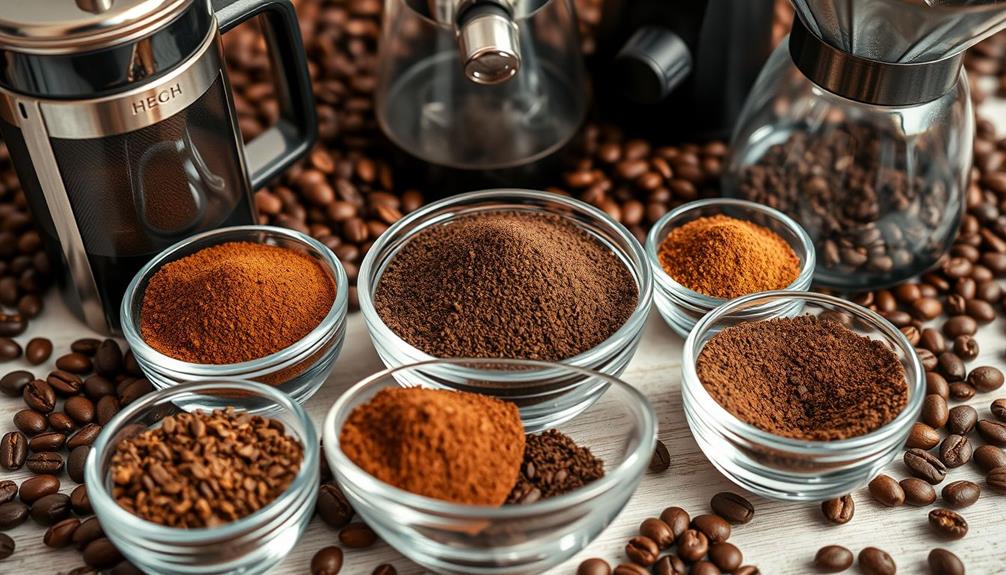
While you mightn't realize it, the grind size of your coffee beans plays a crucial role in how much flavor and nutrition you extract from your brew. Finer grinds generally lead to higher extraction rates of bioactive compounds, boosting both caffeine content and antioxidant activity.
For instance, when you brew espresso or use an Aeropress, the finer grind size enhances the release of soluble compounds, resulting in a more flavorful and nutrient-rich cup compared to coarser grinds used in the French press.
It's essential to match your grind size to your brewing method. Quick brewing styles like espresso require finer grinds for maximum extraction, while longer methods like French press benefit from coarser grinds to avoid bitterness.
If you're inconsistent with your grind size, you risk uneven extraction, which can lead to a lack of uniformity in flavor and nutritional content. For example, a finely ground espresso shot might yield around 63 mg of caffeine, while coarsely ground French press coffee offers about 30 mg.
Differences in Extraction Techniques

Various brewing methods can drastically alter the extraction of bioactive compounds in your coffee, affecting both flavor and nutritional content. When you choose a brewing technique, you influence the levels of compounds like caffeoylquinic acids (CQAs) and the overall antioxidant activity in your cup.
- The V60 method yields the highest CQAs at 124.9 mg/100 mL.
- Cold brew has a unique extraction profile due to its prolonged steeping time.
- Factors like water temperature and grind size play critical roles in your coffee's final flavor profile.
Research shows that the order of effectiveness for extracting desirable compounds is V60 > tubruk > cold brew. The V60 method not only enhances the extraction of CQAs but also demonstrates greater α-glucosidase inhibitory activity at 51.30%, compared to other methods.
Cold brew, while popular for its smoothness and lower acidity, results in a caffeine content of 74 mg per 150 mL cup, which varies from other brewing methods.
Comparison of Brewing Devices
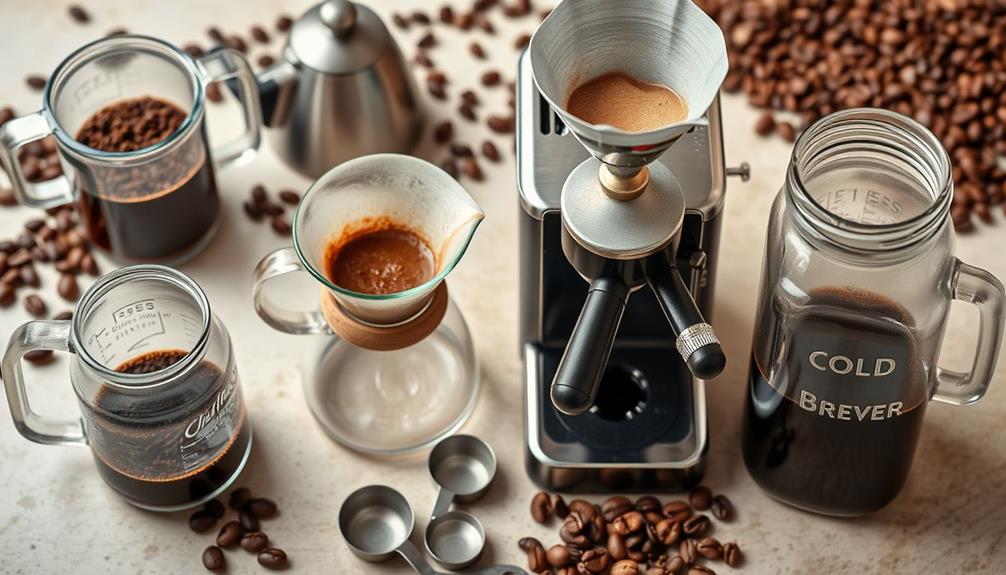
Choosing the right brewing device can greatly impact your coffee experience, from flavor to nutritional content. Different brewing methods yield varying levels of caffeine and bioactive compounds.
For instance, the Aeropress stands out with a remarkable polyphenol content of 191.29 g gallic acid/L, considerably higher than the French press, which measures at 133.90 g gallic acid/L. If you prefer a concentrated cup, espresso machines deliver a powerful brew in just 13 seconds, boasting higher mineral content, like calcium.
On the other hand, cold brew methods, though time-consuming, offer a smooth flavor profile and can extract high caffeine levels when using a favorable coffee-to-water ratio.
The V60 method shines in preserving bioactive compounds, achieving a notable caffeoylquinic acids (CQAs) content of 124.9 mg/100 mL. Meanwhile, the French press, with its metal filter, enhances flavor richness but risks over-extraction, which could diminish the health benefits of your coffee.
Antioxidant Activity in Coffee

Antioxidant activity is an essential aspect of coffee that influences both its health benefits and flavor profile. Different brewing methods greatly impact this activity, making your choice imperative.
For instance, the Aeropress boasts the highest antioxidant inhibition at 42%, while the French press lags behind at 31%. This difference is primarily due to the total polyphenol content, which is highest in Aeropress brews at 191.29 g gallic acid/L, compared to 133.90 g in French press options.
When you consider brewing methods, note these key factors:
- Extraction time: Longer brewing times can lead to reduced antioxidant preservation.
- Brewing temperature: Lower temperatures, like those in cold brew, help retain bioactive compounds.
- Method efficiency: Techniques like V60 minimize oxidation, enhancing antioxidant activity.
Cold brew is particularly effective due to its low temperature and prolonged steeping, allowing it to retain bioactive compounds, including antioxidants.
Ultimately, being mindful of your brewing methods can elevate both your coffee consumption experience and its nutritional benefits.
Health Implications of Brewing Choices
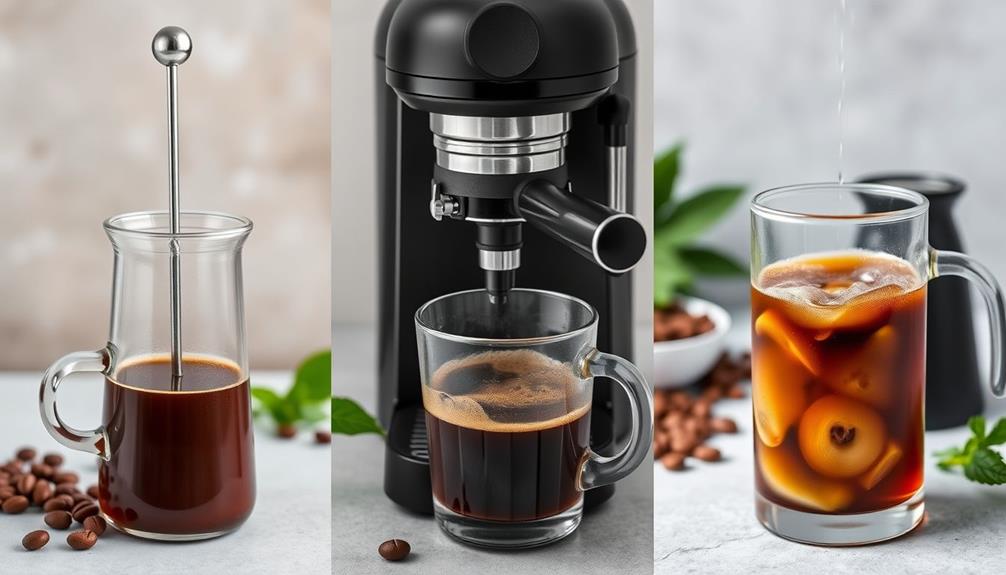
When it comes to your daily coffee ritual, the brewing method you select can profoundly affect your health. Different brewing methods influence the mineral content of your coffee. For example, espresso boasts higher calcium levels compared to drip coffee, which can enhance your dietary intake of vital nutrients.
If you're looking for the best antioxidant activity, the Aeropress method shines with a 42% inhibition rate, helping combat oxidative stress and potentially reducing the risk of chronic diseases.
Additionally, the V60 method stands out by providing the highest levels of caffeoylquinic acids (CQAs), which support glucose metabolism and may lower your risk of type 2 diabetes. Regularly enjoying coffee made via methods like cold brew can also deliver significant daily intakes of bioactive compounds, maximizing your health benefits.
However, it's crucial to stick to the recommended limits—three cups for V60 and five for cold brew—to fully enjoy these perks.
Incorporating various brewing methods not only enhances flavor but also guarantees you're reaping the benefits of minerals and biological compounds that contribute to your overall well-being. Choose wisely!
Frequently Asked Questions
How Does Brewing Method Affect Coffee?
Brewing method affects coffee by altering flavor, aroma, and strength. Each technique extracts different compounds, so whether you prefer a rich espresso or a smooth cold brew, your choice influences your coffee experience greatly.
What Type of Coffee Brewing Is Healthiest?
Imagine sipping a cup of coffee rich in antioxidants. If you're seeking the healthiest brew, try the Aeropress. Its quick extraction maximizes polyphenols and flavor, making it a top choice for health-conscious coffee lovers.
How the Different Processing Methods Affect the Flavor of Coffee?
Different processing methods shape coffee's flavor distinctly. You'll find washed coffees are cleaner and brighter, while natural ones burst with fruity sweetness. Honey-processed beans strike a balance, offering a unique, syrupy taste that's hard to resist.
How Do Different Brewing Times Affect the Level of Caffeine Concentration of Black Coffee?
Shorter brewing times yield less caffeine, while longer extractions boost concentration. You'll find espresso packs a punch in mere seconds, whereas cold brew, with its lengthy process, delivers a rich, caffeinated experience.
Conclusion
In the grand tapestry of coffee brewing, each method weaves its own unique flavor and nutritional thread. By understanding how brewing techniques influence caffeine levels, antioxidants, and overall health benefits, you can tailor your coffee ritual to suit your needs. Whether you prefer a bold espresso or a smooth pour-over, remember that every cup is a chance to savor not just the taste, but the potential health perks that come with it. Enjoy your coffee journey!
In the vast and diverse world of coffee, coffee alternatives, and tea, Olivia has found her calling. As an author and a dedicated coffee and tea aficionado, her work for Cappuccino Oracle reflects her profound love and understanding of the intricate complexities found within these beverages. Olivia’s passion for the subject serves as both a catalyst for her creativity and a connection point with her audience.
Olivia’s appreciation for coffee, coffee alternatives, and tea blossomed at an early age. She discovered that these beverages invigorated her senses and stimulated her creative spirit. From the nuanced flavors of single-origin roasts to the captivating narratives intertwined with coffee, coffee alternatives, and tea trade and culture, Olivia found an unlimited source of inspiration in her daily cup.
Her love for these beverages and her talent for storytelling eventually converged at Cappuccino Oracle. As an author, Olivia’s mission is to illuminate the intricate tapestry that makes up the world of coffee, coffee alternatives, and tea. Her articles span a diverse range of topics, encompassing everything from the unique flavors of different brews to the sociocultural history intertwined with their cultivation and consumption.
Coffee Basics
Debunking Coffee Myths: Separating Fact From Fiction
Get ready to challenge your coffee beliefs as we uncover surprising truths that might just change your morning routine forever.

You might have heard some common coffee myths, but many of them just aren't true. For instance, coffee doesn't dehydrate you; its water content helps maintain hydration. It also doesn't stunt growth; genetics and nutrition are the real factors. You can enjoy coffee without insomnia if you limit your intake in the afternoon and evening. Plus, moderate coffee drinking can actually lower your heart disease risk. Ultimately, while caffeine can create mild dependence, it's nothing like addiction to nicotine. Curious to uncover more surprising truths about your favorite brew? There's plenty more to discover.
Key Takeaways
- Moderate coffee consumption contributes positively to hydration, offsetting caffeine's mild diuretic effect.
- There is no scientific evidence that coffee stunts growth; genetics and nutrition are the primary factors.
- Caffeine sensitivity varies, and moderate coffee consumption earlier in the day does not cause insomnia.
- Research indicates that moderate coffee intake may lower the risk of heart disease rather than increase it.
- While caffeine can lead to mild dependence, it is generally manageable and not comparable to stronger addictions.
Myth 1: Coffee Dehydrates You

Many people believe that coffee dehydrates you, but that's actually a myth. In reality, moderate coffee consumption contributes positively to your daily fluid intake. While it's true that caffeine has a mild diuretic effect, the water content in coffee offsets this, ensuring you stay hydrated.
Understanding the mechanics of brewing methods can further enhance your coffee experience. Scientific evidence shows that enjoying a cup or two won't leave you feeling parched; instead, it reinforces your hydration levels.
Contrary to the common belief that drinking coffee leads to dehydration, you can enjoy your daily cup without worry. The liquid in coffee plays an essential role in maintaining a balanced diet and fluid intake. When consumed in moderation, coffee fits seamlessly into your overall hydration strategy.
Coffee isn't just a source of energy; it's also a valuable part of your daily fluid intake. So, if you're concerned about dehydration, rest assured that enjoying coffee in moderation won't compromise your hydration. Instead, it can enhance your fluid consumption and support your body's needs.
Embrace your coffee habit guilt-free, knowing it can be a beneficial addition to your balanced diet.
Myth 2: Coffee Stunts Growth

Some people worry that drinking coffee can stunt growth, especially in children and adolescents. However, there's no scientific evidence to support this myth. The substances in coffee that could potentially affect growth are present in such negligible amounts that they don't notably impact height development.
Additionally, coffee enthusiasts are encouraged to explore various coffee varieties that can offer unique flavor profiles without any concerns regarding growth.
Growth is primarily influenced by genetics and overall nutrition, not by moderate coffee consumption. In fact, studies have shown that moderate caffeine intake is safe for children and doesn't inhibit their growth. So, if you're concerned about your child's coffee consumption stunting their growth, you can rest easy.
It's important to recognize that myths surrounding coffee and its effects on growth have persisted for years, despite the lack of scientific backing. Enjoying coffee in moderation won't hinder your child's development—instead, focus on providing them with a balanced diet rich in essential nutrients to support their growth.
Encourage them to enjoy coffee if they wish, without the fear of it affecting their height. Remember, understanding the facts can help dispel these myths and promote a healthier perspective on coffee consumption.
Myth 3: Coffee Causes Insomnia

While myths about coffee's effects on growth can be easily dispelled, another common concern revolves around its potential to cause insomnia.
It's vital to recognize that caffeine sensitivity varies among individuals. Some people can enjoy moderate coffee consumption in the evening without experiencing sleep disturbances. For those sensitive to caffeine's effects, limiting intake in the late afternoon and evening can greatly improve sleep quality.
Additionally, just as with other dietary factors, such as the consumption of cranberry juice, understanding the overall impact of your diet on sleep is fundamental. Caffeine is a stimulant and can interfere with sleep for sensitive individuals. However, moderate coffee consumption earlier in the day is generally not linked to insomnia.
Understanding your individual tolerance to caffeine is fundamental in determining how it impacts your sleep. Everyone has different personal limits when it comes to caffeine, so it's important to listen to your body.
If you find that coffee disrupts your sleep, consider switching to decaffeinated coffee options, which allow you to enjoy the flavor without the risk of sleep disruptions.
Myth 4: Coffee Increases Heart Disease Risk

Myth 4: Coffee Increases Heart Disease Risk. This belief has been debunked by numerous studies showing that moderate consumption of coffee, typically 3 to 5 cups a day, may actually lower the risk of heart disease.
In fact, research indicates that regular coffee drinkers often enjoy a reduced likelihood of developing cardiovascular conditions compared to non-drinkers. Additionally, the benefits of a balanced diet, as seen in dietary recommendations for managing various health issues, can complement the positive effects of coffee on heart health consideration of natural remedies.
The notion that coffee harms heart health lacks solid scientific evidence. Instead, it's often the excessive sugar or cream you add that poses a greater risk to your cardiovascular health.
When consumed in moderation, coffee's caffeine can even have protective effects.
Moreover, a meta-analysis of various studies supports the idea that moderate coffee consumption is linked to a decreased risk of cardiovascular diseases.
Remember, moderation is vital; excessive coffee intake or high-calorie additives can negatively impact your health.
Myth 5: Coffee Is Addictive

Believing that coffee is highly addictive can lead to unnecessary worries about your favorite morning brew.
While caffeine can create a mild dependence, it's important to understand that it doesn't compare to the addictive nature of substances like nicotine or opioids.
Additionally, incorporating gentle stretches before bedtime may help relax your body and reduce any tension that could contribute to caffeine cravings.
Most coffee lovers manage their caffeine intake without severe withdrawal symptoms when they cut back.
Here are some key points to take into account:
- Caffeine dependence is generally mild and manageable.
- Most individuals experience minimal withdrawal symptoms.
- Awareness of your individual sensitivity to caffeine is essential.
- Informed choices regarding coffee consumption can enhance enjoyment.
- Regular coffee drinkers can adjust their intake without significant cravings.
Frequently Asked Questions
Can Coffee Affect My Cholesterol Levels?
Yes, coffee can affect your cholesterol levels. Certain compounds in unfiltered coffee, like cafestol, may raise cholesterol. However, filtered coffee typically doesn't have this effect, so your brewing method matters for heart health.
Does Coffee Have Any Nutritional Benefits?
You know what they say: "A cup of coffee a day keeps the doctor away." Coffee's got antioxidants, vitamins, and minerals, so it can offer some nutritional benefits, but moderation's key to enjoying them.
Is Decaf Coffee Healthier Than Regular Coffee?
Decaf coffee can be a healthier choice if you're sensitive to caffeine, as it reduces anxiety and insomnia. However, regular coffee also offers benefits, like antioxidants. It really depends on your personal health needs and preferences.
How Does Coffee Impact Athletic Performance?
Coffee boosts your athletic performance by increasing endurance and focus. It enhances energy levels, reduces perceived effort, and may improve reaction times, making it a popular choice among athletes looking to maximize their workouts.
Can I Drink Coffee During Pregnancy?
When it comes to coffee during pregnancy, moderation's key. You can enjoy a small amount, but consult your doctor. Remember, every cloud has a silver lining, so prioritize your health and your baby's wellbeing.
Conclusion
In the end, coffee isn't the villain it's often made out to be. By busting these myths, you can enjoy your cup of joe without worry. Like a trusty friend, coffee can boost your energy and brighten your day, as long as you drink it in moderation. So go ahead, sip your favorite brew, and savor the rich flavor while knowing the truth. After all, life's too short to let myths steal your joy!
In the vast and diverse world of coffee, coffee alternatives, and tea, Olivia has found her calling. As an author and a dedicated coffee and tea aficionado, her work for Cappuccino Oracle reflects her profound love and understanding of the intricate complexities found within these beverages. Olivia’s passion for the subject serves as both a catalyst for her creativity and a connection point with her audience.
Olivia’s appreciation for coffee, coffee alternatives, and tea blossomed at an early age. She discovered that these beverages invigorated her senses and stimulated her creative spirit. From the nuanced flavors of single-origin roasts to the captivating narratives intertwined with coffee, coffee alternatives, and tea trade and culture, Olivia found an unlimited source of inspiration in her daily cup.
Her love for these beverages and her talent for storytelling eventually converged at Cappuccino Oracle. As an author, Olivia’s mission is to illuminate the intricate tapestry that makes up the world of coffee, coffee alternatives, and tea. Her articles span a diverse range of topics, encompassing everything from the unique flavors of different brews to the sociocultural history intertwined with their cultivation and consumption.
-

 Coffee Basics3 weeks ago
Coffee Basics3 weeks ago10 Potential Health Risks of Single-Serve Coffee Pods and How to Mitigate Them
-

 Coffee Basics3 weeks ago
Coffee Basics3 weeks agoCaffeine Content Comparison: Nespresso Vs. Traditional Coffee Vs. Energy Drinks
-

 Coffee Basics2 weeks ago
Coffee Basics2 weeks agoThe Impact of Coffee on Digestive Health: What Science Says
-

 Coffee Basics2 weeks ago
Coffee Basics2 weeks agoYerba Mate: The South American Superfood and Its Health Benefits
-

 Coffee Basics3 weeks ago
Coffee Basics3 weeks agoCelebrity Coffee Habits: Insights From TV and Movie Stars
-

 Coffee Basics3 weeks ago
Coffee Basics3 weeks agoSoft Drinks and Medical Tests: What You Need to Know
-

 Coffee Basics2 weeks ago
Coffee Basics2 weeks agoHerbal Teas for Every Occasion: From Relaxation to Romance
-

 Coffee Basics3 weeks ago
Coffee Basics3 weeks agoMaximizing the Shelf Life of Your Matcha: Storage Tips and Tricks































